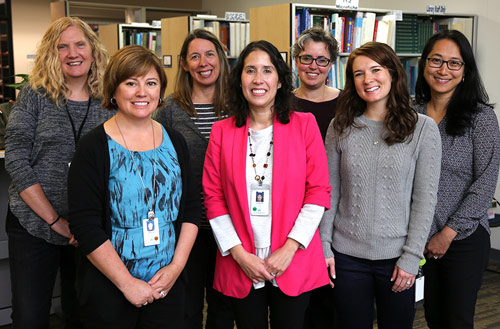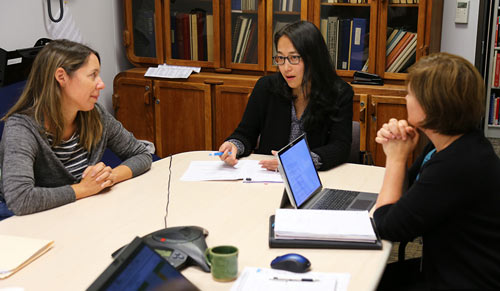Engaging with Patients to Boost Colorectal Cancer Screening and Reduce Disparities
Stories - Oct 26 2018

By Jamie Thompson, MPH, Research Associate
A team from the Center for Health Research visited AltaMed Health Services in Los Angeles as part of a community-based participatory research project designed to increase colorectal cancer screening rates in underserved populations.
“Enchilada!”
“Chocolate!”
“Tacos!”
The room of 25 health promoters, educators, and other staff burst into laughter as each person shouted out their favorite food. This icebreaker activity kicked off a half-day Health Education Training this summer at Los Angeles-based AltaMed Health Services, the largest federally qualified health center (FQHC) in the United States. And while our spirits were high and our smiles wide, our shared purpose was serious: to improve the rates of colorectal cancer (CRC) screening in underserved populations.
Along with Dr. Gloria Coronado, Distinguished Investigator at the Kaiser Permanente Center for Health Research, and Senior Research Associate Amanda Petrik, I made the trip to AltaMed to help lead the session on conducting outreach calls with patients who had never completed a CRC screening test, specifically the fecal immunochemical test (FIT), a simple at-home test that looks for blood in the stool.
Our goal for the day was to partner with AltaMed health promoters and educators on how to engage patients by telephone and encourage completion of the FIT test.
Why It Matters
First, a bit of background. Colorectal cancer is the second leading cause of cancer deaths in the United States. Regular screening can reduce the number of new cases and deaths from CRC by finding and removing polyps or cancer at early treatable stages. However, CRC screening rates are marked by demographic disparities, with underserved populations—including Latinos, the uninsured, and those living in the U.S. for fewer than ten years—having the lowest rates.
We’ve learned from our research that adults who have completed a FIT in the past are more likely to do it again, leading to a habit of yearly FIT screening. On the other hand, those who have never completed a FIT are unlikely to complete it and are at increased risk of CRC detection at a later stage.
We wanted to determine whether adults who have never completed a FIT may benefit from a phone-based discussion about the importance of CRC screening. For this reason, we partnered with AltaMed Health Services’ team of health educators and health promoters.
 The Participatory Research to Advance Colon Cancer Prevention (PROMPT) team (left to right): Jennifer Schneider, Amanda Petrik, Gloria Coronado, Jennifer Rivelli, Sacha Reich, Allea Martin, Jamie Thompson
The Participatory Research to Advance Colon Cancer Prevention (PROMPT) team (left to right): Jennifer Schneider, Amanda Petrik, Gloria Coronado, Jennifer Rivelli, Sacha Reich, Allea Martin, Jamie Thompson
PROMPTing Patients to Be Screened
The partnership with AltaMed is taking place under the auspices of the Participatory Research to Advance Colon Cancer Prevention (PROMPT) study, funded by a grant from the National Institute on Minority Health and Health Disparities. PROMPT is a community-based participatory research project designed to increase CRC screening in FQHCs and decrease CRC screening disparities in priority populations, including minority racial/ethnic and low-income individuals. In addition to the Kaiser Permanente Center for Health Research and AltaMed, the partnership includes Oregon Health & Science University.
In our work within AltaMed’s network of health centers, our primary research aim is to compare the effectiveness of automated and live prompts and reminders to a mailed FIT outreach program. AltaMed patients led the way in developing and refining the content of these prompts and reminders, through a validated engagement process called boot camp translation (BCT).[1] The results of the overall study will help inform future efforts to increase FIT return rates for mailed outreach programs.
To boost screening in the group that has never completed a FIT, our main trial tests live phone call prompts delivered before a FIT is mailed. Studies have shown that mailing FIT kits directly to a patient’s home can increase CRC screening among underserved populations.[2-7] Health promoters and educators were trained (as described above) to call AltaMed patients with no history of FIT completion before their annual FIT arrives in the mail. The goal is to increase patient understanding of the importance of screening and to remove any barriers getting in the way of screening.
Over a period of three weeks, 17 health promoters and educators called 1,054 patients who had never completed a FIT test! We are in the process of gathering and analyzing these data.
 PROMPT Principal Investigator Gloria Coronado (left) meets with team members Jamie Thompson (center) and Amanda Petrik (right).
PROMPT Principal Investigator Gloria Coronado (left) meets with team members Jamie Thompson (center) and Amanda Petrik (right).
A Closer Look at Boot Camp Translation
We used BCT to develop the content and select the format of prompts and reminders for this study.[8] We recruited 25 patients and 4 clinic staff to participate in two parallel BCT programs—one in English and one in Spanish. Each program included a 6-hour in-person session that consisted of an expert presentation and interactive large- and small-group activities aimed at developing initial drafts of outreach materials. There were also three 30- to 45-minute group conference calls facilitated by a member of the project team.
The sessions and conference calls were held over three months in mid-2017. The goal of the conference calls was to obtain patient feedback on draft program outreach materials that were designed with guidance from the in-person sessions. The materials included a text message, an introductory letter, a one-page pictographic educational fact sheet, and automated and live reminder phone call scripts. Check out some of these materials on www.mailedfit.org!
Boot camp translation provides a novel way to work directly with patients early in the research process, ensuring that study messages and materials are not only relevant to participants, but also culturally relevant. This patient engagement approach honors the local and cultural aspects of a community within the context of evidence-based health care.
As we move forward in this project, we will continue to test the optimal timing and modality of prompts and reminders to encourage FIT completion among patients.
What Patients Are Saying
I’d like to leave you with a few quotes from patients about their experience participating in our study through the BCT process. These comments make me proud of our approach to this important research area—and optimistic about the impact of our findings.
“I learned a lot about colon cancer and look forward to our phone calls.”
“I enjoyed learning about the FIT kit and the different ways of getting information to patients. It’s very helpful to spread the word to patients.
“The staff was awesome. They were very clear and informative. They did a great job.”
“I was so happy with what I learned today. Thank you.”
References
- Norman N, Bennett C, Cowart S, et al. Boot camp translation: a method for building a community of solution. J Am Board Fam Med. 2013;26(3):254-263.
- Coronado GD, Golovaty I, Longton G, Levy L, Jimenez R. Effectiveness of a clinic-based colorectal cancer screening promotion program for underserved Hispanics. Cancer. 2011;117(8):1745-1754.
- Baker DW, Brown T, Buchanan DR, et al. Comparative effectiveness of a multifaceted intervention to improve adherence to annual colorectal cancer screening in community health centers: a randomized clinical trial. JAMA Intern Med. 2014;174(8):1235-1241.
- Goldberg D, Schiff GD, McNutt R, Furumoto-Dawson A, Hammerman M, Hoffman A. Mailings timed to patients' appointments: a controlled trial of fecal occult blood test cards. Am J Prev Med. 2004;26(5):431-435.
- Goldman SN, Liss DT, Brown T, et al. Comparative Effectiveness of Multifaceted Outreach to Initiate Colorectal Cancer Screening in Community Health Centers: A Randomized Controlled Trial. J Gen Intern Med. 2015;30(8):1178-1184.
- Gupta S, Halm EA, Rockey DC, et al. Comparative effectiveness of fecal immunochemical test outreach, colonoscopy outreach, and usual care for boosting colorectal cancer screening among the underserved: a randomized clinical trial. JAMA Intern Med. 2013;173(18):1725-1732.
- Davis MM, Freeman M, Shannon J, et al. A systematic review of clinic and community intervention to increase fecal testing for colorectal cancer in rural and low-income populations in the United States - How, what and when? BMC cancer. 2018;18(1):40.
- Thompson J, Davis M, Michaels L, et al. Patient-refined Messaging for a Mailed Colorectal Cancer Screening Program: Application of Boot Camp Translation in a Latino-based Community Health Center. J Am Board Fam Med. Accepted for publication in 2019.